Tag: roth ira

3 Retirement Savings Tips Before Year-End (Full Webinar)
Jason 0 Comments Retire Wealthy Retirement Planning Tips for Retiree's
Welcome, everyone, thank you for joining us today. My name is Ewelina Caplap, Wealth Management operations manager at Coastal Credit Union, where we bank better to live better. Today, we will be sharing with you three retirement savings tips before year end. So hopefully today you will come out of this session with some great action items. Joining me today are David Burk, CFS financial advisor, and Drew Snider, CFP, director of financial planning here at Coastal Credit Union. Welcome to you both.
So before we get into our exciting conversation, we will very quickly cover our disclosure slide. Coastal Credit Union contracts with CUSO Financial Services to offer investment products to its members, which can fluctuate with market activity and potentially have some risk. So getting into our exciting conversation today about three retirement savings tips for year end. At this time, let's talk about tip one. Tip one, Roth IRAs. We hear about Roth IRAs quite a lot and the potential tax free income they provide. David, why don't you start us off with a little bit about what this tip is? Thanks, Ewelina.
A Roth IRA is an IRA that you're actually using after-tax dollars to invest in a credit union or an investment Roth IRA and letting that grow tax deferred so that after age 59 and a half, you'll be able to withdraw money out of that account that is 100 percent tax free. That's a huge financial and tax benefit that you should certainly consider before year end. Why don't you add a little bit more to that, Drew? Yeah, the Roth IRA is is definitely the greatest savings tool we have for retirement.
As the illustration shows, the seed for our tree is what's getting taxed. And then you grow this beautiful tree with all this great money on it and you get to take the money off and you don't pay taxes on the money. So it's fantastic and everyone should consider if they can do it or not. The beauty of looking at a Roth IRA going into December is you have a vision of what your income is for the year and you have limitations on contributions based on what your income was for twenty twenty one.
So if your income is basically under about one hundred twenty five thousand dollars as a single person or one hundred ninety eight thousand dollars as joint filers, you should definitely be looking at a Roth IRA and coming into the credit union and talking to us to see if it'll work for you. That's excellent. What a great first tip to consider taking care of before the year end. So we're now going to move over to tip number two, and we're going to talk about some 401(k)s. What can you tell us here, David? 401(k)s are offered typically through an employer or as an employer sponsored retirement plan.
They've been around for quite some time now, and many employees should be taking full advantage of this retirement savings. And again, since we're now getting towards the end of the year, it's always a benefit to evaluate your income at this year, like Drew mentioned in the previous slide. But then also what your income will be next year and give yourself a savings raise of trying to increase your savings. Drew, I'll let you expand more about the comparison of Nick versus Maria and what their savings has done over time. Sure, I'd be happy to. This is a very simple graphic of two individuals who make the same amount of money and started off saving the same amount of money, the same percentage to their 401k plan. Nick maintained that savings rate, whereas Maria, each year, increased her savings rate by one percent or her contribution rate by one percent to her 401k plan until it maxed out at 15 percent.
And you can see that over time, Maria had quite a bit more money. This is after 30 years. She had twice as much money for retirement as did Nick. And you know what? You don't really need to concentrate on anything other than the fact that that right bar looks a lot bigger than the left bar. So with proper planning, we can help our viewers get there. Yeah, just one more comment here.

Before year end, everyone should take a look at their 401k statement and see if they maximized. If they're trying to maximize the amount that they can contribute, they should take a look at that and see if they've been able to do that this year, because a lot of people may think that they are maximizing their contributions when in fact they haven't. Right? Good point. And another thing, I'm not sure if we mentioned it, if you have a Roth 401k option on your plan, if we're talking about a Roth IRAs, certainly Roth 401k option is something that our viewers should be looking into. Can either one of you speak to that for a minute? Yeah, that's an interesting comment, Ewelina, because that's still relatively new in the marketplace and offered through employer 401k plans, but the numbers are astounding how few people are really taking full advantage of that Roth opportunity in their 401k.
And what that means is, you can actually contribute more towards your Roth 401k than you can a Roth IRA outside of your employer-sponsored plan. Plus, your income is not a restrictive factor in being able to contribute to the Roth 401K plan. And just add to that, I would encourage anybody, even high income people who really do like the tax deduction that they're getting from their traditional 401k contributions. It's not an either/or situation. You know, if you're not doing either traditional or Roth, you can do some in both. Personally, I do some in both of mine. I do some in the traditional and I do some in the Roth in my contributions.
I do the same thing on my own planning as well. Well, certainly a lot to take in and consider for year end. So we're going to move on to our final tip. Tip three. Health savings accounts, right? HSAs. And who doesn't like the sound of triple tax savings? So, David, what don't you tell us a little bit about that first? The triple tax saving on a health savings account is phenomenal, and many people have completely overlooked this opportunity for their own household and and being able to save tax free money.
So what ends up happening. If your employer offers you a high deductible health account, then you can participate in an HSA. And what you're able to do is contribute on an individual basis or as a family, and that money can be tax deductible as far as the contribution. Once that money is in your HSA, it grows tax deferred. And then when you're ready to start withdrawing money from an HSA for a qualifying medical or health care expense, it's one hundred percent tax free as a distribution. And I want to comment here. As as you come to the year end, some employers are going to contribute some money to your HSA for you. You can add the rest up to the maximum. And you have until April 15th to do that. But the year end is a great time to take a look to see how much your employer has put into that plan for you. And then what is the calculation? What's the amount that you can add to it? Because you can reduce your taxes in your 2021 tax return, you get tax deferral and you can take the money out tax free for qualified health care expenses.
Excellent. So it sounds like there's a lot to get done here working with Team Coastal. So who are we right? Who is Team Coastal? Drew, can you talk to us about how we can help our viewers in meeting these three tips? Putting them into action? Yeah. Whether you're talking to Coastal Wealth Management about these concepts that we talked about today, or if you go into the branch, the credit union, you're going to get a team of experienced people that are going to be able to help you make your contributions, maximize your retirement. At Coastal, they're going to talk to you about your savings account options and Wealth Management. If you have a more longer term perspective, we're going to show you some investment options for your IRAs. And then, you know, one thing about Coastal Wealth Management is, you know, we have lots of options to help you to find a great solution that you're comfortable with.
That fits your risk tolerance and your needs, and we're all working together. So whether you talk to someone at the branch and you tell them, Hey, I'd like to get a better rate of return, than you're offering in that savings account, they're going to bring us into the conversation with Wealth Management so we can talk to you about how we can help. So we're all working together at Team Coastal. And then obviously, if you want to do a financial plan with us, we'd be happy to help you with that. Absolutely. And speaking of that financial plan, for our viewers, if they are not aware, it is a complimentary financial review to meet with our team and discover all the options available to you with Team Coastal, whether that be something that our retail team can help you or our Wealth Management department specifically, we all work together and can hopefully help you reach your goals. Schedule your complimentary Financial Review with us today. You can call us at 919-882-6655. You can certainly send us an email [email protected]. And of course, you can find us online as well.
There are some action items to take here with these three tips before year end. We're happy to help you with that. Thank you again… David Burke, CFS financial advisor, one of our dedicated advisors for being with me here today, and of course, Drew Snider, our financial planning director here at Coastal Credit Union. Thank you for your time today and thank you to our viewers for joining us. And reach out to us. We'll be happy to help you..
Read More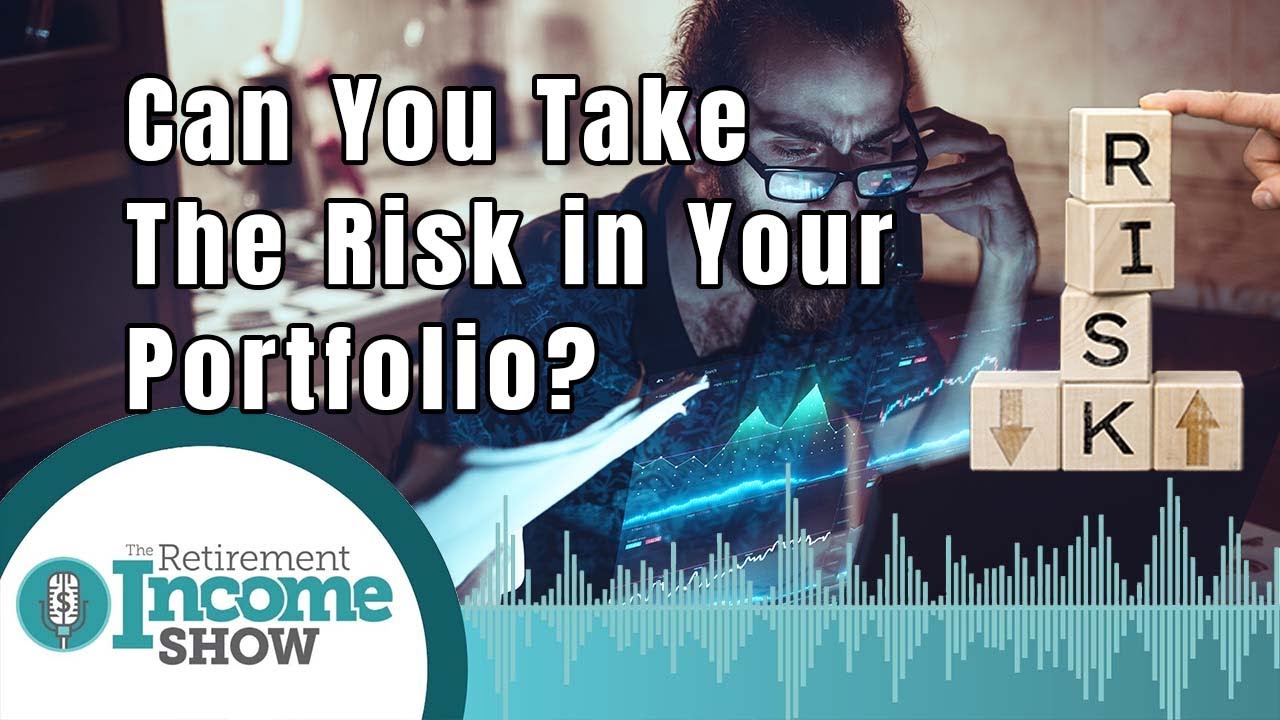
Step 1 The Retirement Success Process: Investment and Risk Management
Jason 0 Comments Retire Wealthy Retirement Planning Tips for Retiree's
foreign welcome back to the retirement income show I'm Mark Elliott here with the CEO and founder of Oak Harvest Finance group we're talking about the retirement success plan once it's in place it's not done it's not finished it's always changing and evolving with you and your life so it's really important to get this in place to have a plan give you more confidence and and be more comfortable in retirement with maybe hopefully not so much stress about where you are again that number is 800-822-6434 to learn more 800-822-6434 Troy's breaking down what is exactly the retirement success plan so it starts with the investment plan then it's the income plan then it's a tax plan then it's a health plan and then it is the estate plan so I want to kind of tie together why that sequence is is important just briefly but if you don't understand if you don't have a proper risk management structure in place obviously you open the potential for losses beyond your willingness to stay the course now it's not just stay the course with the Investments it's stay the course with your retirement success plan with your financial plan so we have to Define what those guard rails are first this is the process of understanding where your risk limitations are so if you think about you're going down a highway and of course you have guard rails on each side and if you go off the highway those guard rails are there to protect you from going into the opposing Direction on the freeway now in retirement when we're talking about managing risk when we can identify these emotional guardrails so are you willing to see and I and I'd like to Define risk in terms of dollars not percentages and I'll tell you why in a minute but let's say you have a million dollars saved for retirement if all that money is in your 401k first and foremost we have to realize that it's not really a million dollars because every dollar in there is tax deferred so we have to understand we're going to address that as part of this process but when we talk about risk we have to understand that not all of those dollars are yours you have a junior partner on that account we want to keep them a junior partner we don't want Uncle Sam to become a senior partner or a majority share owner of your retirement account but just understanding that that not all of that money is yours that you do have a junior partner in that account it ties into this risk management discussion a little bit so when we talk about risk in terms of dollars are you willing to see your account go down two hundred thousand just a question could be yes could be no it doesn't there is no right or wrong answer but by asking these questions we can start to Define where your emotional guard rails are because the number one thing that you can do when it comes to ruining a financial plan or a retirement plan is to have more risks so your accounts go down more than you can mentally tolerate emotionally withstand and then you sell get out sit in cash for two or three years miss the rebound and now you're you're in a you know you're in a bad bad bad spot I can't tell you I mean we've been through this so many times with clients and conversations about you know Troy I've been watching the news I think we're going into recession we need to get out of the market we need to do this or my accounts are down 10 or 20 or when covid hit we there's a plan for for a proper plan accounts for the markets being down 20 or 30 percent so when we talk about risk management and we're asking you these questions the reason why is because we're already planning for recessions we're planning for potential Market crashes this is part of life okay we cannot avoid these things unless we completely stay in cash and if that's the case you might as well bury the money in the backyard and just spend whatever you can and hope you don't run out and eat rice and beans for for for retirement and that's not how most of our clients that's not how most of you want to spend you know after working for an entire career you want to spend your life so are you okay with a 200 000 decline by the way which is 20 and the reason why I Define it in terms of dollars is because a long time ago I had a client come in well it was a prospective client at the time and like most financial advisors we would talk about it in terms of percentages and and we said are you okay with a 10 or 20 decline he said you know what 20 is pretty much my Max and he had around a million dollars so then I I just happened to put it in terms of dollars and I said okay so if your accounts go down two hundred thousand dollars you're okay with that and he said he said no Troy he said I would fire you on the spot and so that you know for me it connected a Big Dot It was kind of a big evolution in my career when I was younger because I realized I'm a financial guy I do this every single day I think in terms of percentages and statistics and and but most people think in terms of dollars so when we ask you that question you say yes I'm okay with a 200 000 or 100 000 or maybe it's not even close to that or maybe it's much much much more what that does for us is it helps to Define what type of portfolio we need to construct so emotionally there's a small probability that it is going to hit your your downside guard ramp and if we can go through retirement and not ever hit that downside guard rail well there's a very good chance from our experience that you're going to stay the course you're going to stick with your plan and if you can stick with your plan you have a much higher probability of success in retirement this is why we call it the retirement success process this is why we call it a retirement success plan this is what we want to deliver to you so now I said I wanted to talk a little bit about the sequence and why risk management in investment planning comes first if we don't and in most simple terms if if your money let's say you have a million bucks and you never had to take anything out if you average four percent versus nine percent at higher rates of return you obviously can expect your accounts to grow to a larger value that means the income planning is impacted that also means that now your tax planning is impacted so we can't build an income plan or a tax plan without first understanding an estimated reasonable expected return for a combination of Securities inside a portfolio so step one has to be this risk management discussion which then can lead us to the investment construction of your portfolio which then gives us a pretty good idea of expected return upside downside deviation so we can now start talking about income planning we can actually project and do a sensitivity analysis on tax planning based on different account levels let me break that down for you before we get into the tax planning section later on the show if you have a million dollars in your IRA you are forced to start taking a certain percentage out it's around four percent at age 72 but as you get to be 74 76 77 you're required to distribute a larger and larger percentage so if your million grows to 1.5 you take let's say four percent of that out that's a that's a number that is less than if your IRA grows to 2 million so the more aggressive your portfolio is or the higher expected return the more we should anticipate that require minimum distribution being a larger number that rmd is the amount you're forced to take out and pay taxes on we've seen clients I I'd like to phrase this for prospective clients because we address this with you as a client this is part of the retirement success process and the retirement success plan but so often when someone comes in here and they've done a pretty good job saving they have eight hundred thousand they have a million they have two or three million when we start to do this analysis if you don't address this tax problem and it is a tax problem it can be you know a tax nightmare for many of you those rmds when we get out to be 75 and 77 or 78 a hundred thousand hundred and fifty thousand two hundred thousand now you're taking that money out you're probably not spending that much on top of Social Security on top of any rental income or real estate income or pension or dividend or interest or any other income that you have outside of your retirement account and we've seen many people be in a much higher tax bracket and have much more income in their 80s than they ever had throughout their entire life up to that point and it's because of a lack of planning so that's what we're trying to get ahead of so we have to understand the risk structure of our portfolio and how we manage that risk so we can keep you on course we can keep you on schedule with your plan that then gives us an idea of a range of expected returns based on basic financial planning Concepts from there we can develop that income strategy and income is not just Social Security it's not just how much to take out don't get me started on the four percent rule but it is also from which accounts and then we get into the taxes so if you don't have a retirement success plan give us a call 1-800-822-6434 we're going to walk you through this process if you become a client you will have this plan in place that deals with risk Investments taxes income along with the rest of the retirement success plan 1-800-822-6434 Oak Harvest Financial Group check out the website check out the YouTube channel Oak Harvest Financial Group so we're talking about the retirement success plan Troy still got a lot to get to stay with us we're back in one minute investment advisory services offered through Oak Harvest Financial Group LLC Oak Harbor's Financial Group is an independent Financial Services firm that helps people create retirement strategies using a variety of insurance and investment products investing involves risk including the loss of principal any references to protection benefits or lifetime income generally refer to fixed Insurance products never Securities or investment products insurance and annuity product guarantees are backed by the financial strength and claims paying ability of the issuing insurance company Oak Harbor's Financial Group LLC is not permitted to offer a No statement made during this show shall constitute tax or legal advice you should speak to a qualified professional before making any decisions about your personal situation we are not affiliated with the US government or any governmental agency this radio show is a paid placement foreign [Music]

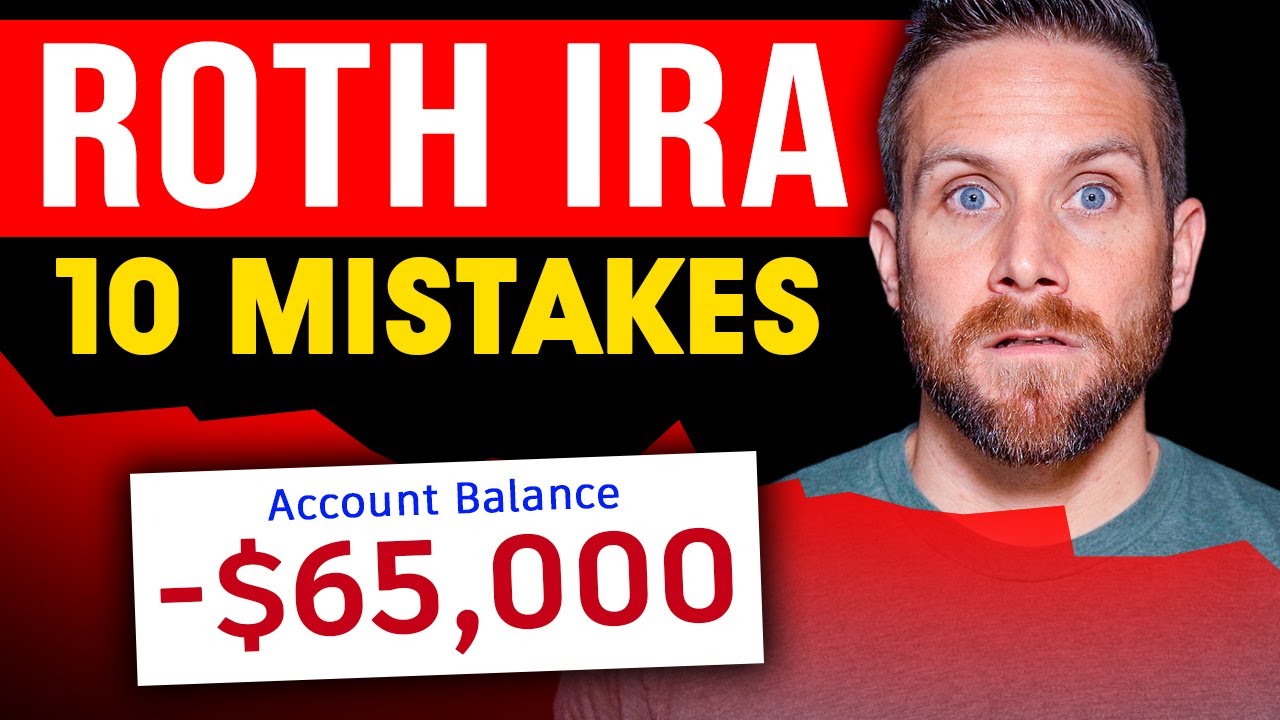
The $65,000 Roth IRA Mistake To Avoid
Jason 0 Comments Retire Wealthy Retirement Planning
– I've seen too many of
you making some mistakes when it comes to investing
in your Roth IRA. One of them could cost you
$65,000 and the other one could cost you almost $500,000. You guys are seriously going
to make my beard turn more gray than it already is if
you don't knock it off. So let me show you what to watch out for, that way, you don't lose more money than you have to and
I can save a few bucks on hair dye for a couple more years.
A Roth IRA is a self-directed
retirement account where you can contribute after
tax dollars to be invested. Since the money going in is taxed, the growth of your investments are not taxed and the money withdrawal from the account are never taxed either, as long as you don't try to pull out some of the money before the age of 59.5. There is no such thing
as a joint Roth IRA. So if you and your spouse
want to contribute to one, then you'll have to do it individually, hence the name Individual
Retirement Account. If you both have enough
earned income separately, then you can each invest up to the $6500 limit for the year. If one of you works and the other doesn't, but you file a joint tax return, then the person working can, of course, contribute to a Roth IRA and
your spouse can contribute to a Spousal Roth IRA as well. Remember, these accounts are
owned by the individual person and on paper, not co-owned by both people.
I want to try to encourage you to max out your Roth IRA every single year, if possible, because if you
don't do it for that year, then in the future you
cannot go back and contribute for a previous year once that time limit has passed. A Roth IRA is one of those accounts where I would bend over backwards to make sure that I can
put in the full amount allowed every single year. In my order of operations for
what to do with your money, I have maxing out a Roth
IRA right after investing up to your employer match and HSA. That is how important
this type of account is. The good news with this
is that you actually have a timeframe of 16
months to contribute for each calendar year. So if we are in 2023
right now, then you have from January 1st, 2023, up until
when taxes need to be filed for that year to contribute,
which in this case, would be April 15th, 2024.
That's how it is every single year, so ignore the actual dates in my example and pay more attention to the timeframes since the date taxes are due
will change by a few days from year to year. Most brokerages will ask
you which year you want to contribute to. For example, I personally
invest using M1 Finance, which you can check out down
in the description below, and also get a deposit bonus as well. If I contributed to my Roth
IRA through them right now, then they would ask if I wanted the money to go towards 2022 or 2023, since at the time of recording this, we haven't hit the date
where taxes are due. This is great because it
gives you some extra time beyond the current year to
contribute Roth IRA money for that year.
Before I tell you the next mistake that I see way too many people making, please help support my dog Molly by hitting that thumbs up
button and sharing this video with anyone you think it would help. Once you deposit money into your Roth IRA, there's one more extremely important step you need to do that I see a ton of people missing, and that is
actually investing the money. I can't tell you how
many people I've talked to over the years who just put money into the account assuming
it would automatically grow, or knowing that they
needed to invest the money, but just forgetting to do
it because life happens, and things naturally slip out of our mind, only to check their account
balance years later, realizing that it hasn't grown in value because they didn't invest the money.
Stop the nonsense here and
just set up auto investing within your investment account, and if you're waiting because you think that you can time the market
to buy in at a lower price, you can't, because it's
nearly impossible to do, so just to get the money
invested right now. If you know how you want to
invest the money, then great. If you don't, then I personally
like the two fund portfolio for people who are in
the accumulation phase of investing and in the
three fund portfolio for when you're closer to
retirement or in retirement.
I'll have a link to a
playlist then I made just for you where I teach you
about both of those portfolios down in the description below
and above my head as well. When you contribute to a Roth IRA, all of your money is not
locked up until 59.5. You can withdraw the
contributions that you've made before that age without paying a penalty, but you cannot withdraw any of
the gains within the account. For example, if you've contributed $6500 and the account has grown to $10,000, then you can withdraw
the $6500 contribution, but you cannot touch the $3500 gain without paying a penalty until 59.5. I've gotta interject for a second to give my personal opinion on this. While withdrawing money
penalty-free is an option, I want to encourage you not to do this. To be brutally honest, I think that doing this
is one of the dumbest, most irresponsible, short-sighted
things that you can do.
Withdrawing just $6500
worth of contributions would cost you $65,000 in
future investment growth. So when any money is
taken out of this account before retirement, think
about how it's actually going to cost you 7,800 Chipotle burritos, or 65 new Apple iPhones, or anything else that you would buy for that amount of money. And yes, I am fully aware
that you can do a penalty-free early withdrawal up to
$10,000 before the age of 59.5 for a first time home purchase. But this is just as stupid as withdrawing your contributions early
because that $10,000 is costing you over $100,000
in future investment growth when you pull that money out. Average annual home appreciation over the past 12 years has been 6.11%, and the US stock market
has returned 12.27%. Leave your money in the freaking Roth IRA and go earn that $10,000 that
you need to buy the home. Responsible investing takes time, like five or 10-plus years, and this money needs time to grow.

The second you withdraw
any of your contributions, you are cutting down that tree before it even has a chance to grow fruit. Once you withdraw
contributions from the past, you cannot replace that
money in the future. I get that emergencies happen in life, so that's why you need
to have money set aside in an emergency fund to
pay for those things. Do not, under 99.999% of circumstances, use your Roth IRA money for anything other than when you retire. One thing I see way too many people doing is investing in a
taxable brokerage account before they have their Roth
IRA maxed out for the year.
This is a huge mistake from a tax savings
perspective for some of you because of how each account is taxed. With a Roth IRA, you invest with money
that's already been taxed, so the money can grow tax-free
and be withdrawn tax-free. With a taxable brokerage
account, you are paying taxes for the ongoing dividend
distributions every single year. Then you have to pay capital gains tax when you go to withdraw the money.
Since the money within
a Roth IRA will grow and can be withdrawn tax-free, realistically, you want
this account to get as large as possible, but not at the expense of
your personal risk tolerance. You should not take on
additional levels of risk by investing in more
risky, unprofitable stocks that random YouTubers have been pumping over the past few years or actively manage funds to
try to achieve higher returns. 99% of people, including
myself, cannot handle investing in something with a
high risk and potential, potential, high return. So don't even bother. The money in this account
is for retirement, so is it really worth it to risk that 60-year-old's financial wellbeing because you decided to gamble with their money right now? I doubt it. Some of you might be over
the income limit to be able to contribute to a Roth IRA, or some of you will be at
that point in the future as your income grows. You can still contribute to a Roth IRA to take advantage of the tax-free growth by doing a backdoor Roth. To simply explain the process,
all you do is contribute to a traditional IRA.
Do not invest the money yet. Then contact your brokerage
to have them convert the money to a Roth IRA. Now, I have done it with M1 Finance before and it was extremely easy. It only took I think two or three days for the money to get into my Roth IRA. Only do this if it makes sense based on your current tax rates
and future financial plans. There's two things that you can do. if you are someone who thinks that you might be over the income limit, but you are not going to 100%
know until the year is over. Number one, you can
either wait until January of the following year,
like we talked about in one of the previous mistakes that
I mentioned, or number two, you can just contribute the
money to a traditional IRA, then do a backdoor Roth within
the year to get the money into the account so it can be invested.
That way, if you are
over the income limit, you've already done the backdoor Roth. If you're under the income limit, no big deal 'cause you had to pay taxes on that money that was going
into the Roth IRA anyways. A question I get a lot is
whether or not you can contribute to a Roth IRA on different brokerages. The simple answer is yes. This is how it would play out. You can contribute up to the max for one year
on, say, M1 Finance.
Then you can decide to contribute up to the max on fidelity the next year. Then you can contribute up to the max on Vanguard the following year. So by the end of that third year, you would have three different Roth IRAs with three different brokerages, and there is no problem with that. You can take it one step further. If you decide, hey, out of these three, I actually like M1 finance
better than the other two, you can convert the
Roth IRAs with Fidelity and Vanguard into your
M1 Finance Roth IRA.
You can also split up your contribution for the same year among
different brokerages. So if for this year you want
to say contribute $4,000 to an M1 Finance Roth IRA and the remaining $2,500
into a Fidelity Roth IRA, then you can do that without any problems. The only thing you
cannot do is try to game the system by saying contributing $6500 into an M1 Finance Roth IRA and $6500 into a Roth IRA with another brokerage. You cannot exceed the maximum
amount allowed per year across all of your Roth IRAs on all of your brokerage accounts. Technically, you could do that since all of the brokerages aren't talking
to each other to keep track of what you are contributing, so you have to self-manage this. I would highly, highly recommend making sure
that you do not do this, whether it's on purpose or on accident. I don't know what the penalty is for this, but all I know is that you do
not want to get caught trying to defraud the government
in any way, shape, or form.
Long-term investing is the name
of the game with a Roth IRA. This money is for when
you are in retirement, so make sure to take that into account when investing this money. No gambling it on stocks
that random YouTubers are promoting. I think the two or three fund portfolio is perfect for your Roth IRA, which you can learn more about
in these videos to your left. There's a bunch of free stocks and resources down in
the description below to help with all of your personal finance and investing needs. I'll see you in the next one, friends, go..
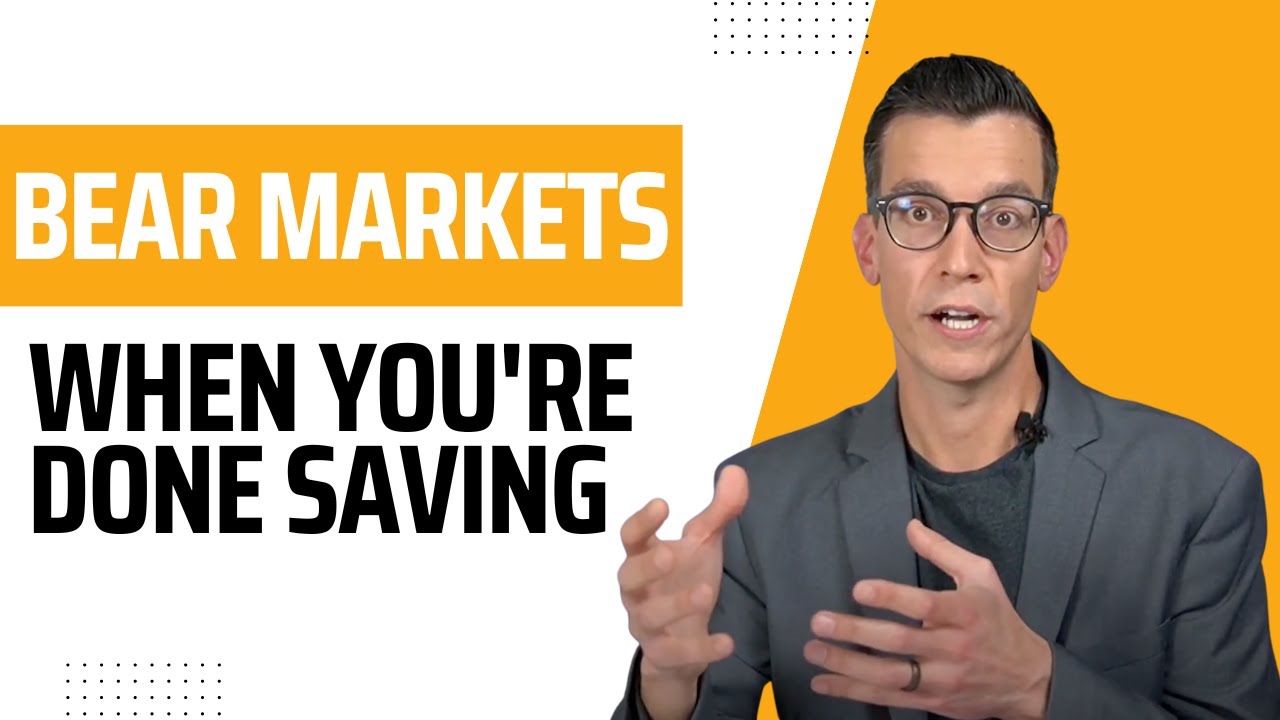
Retirement Planning During Bear Markets – Especially if It’s Your First One In Retirement
Jason 0 Comments Retire Wealthy Retirement Planning Tips for Retiree's
bear markets can feel a lot different when you're retired and you're no longer earning income from work especially if this is your first bear Market since you stopped working when you were younger you know you had time on your side you know you may have even seen drops in the market as an opportunity because it gave you additional time and you got to purchase more shares well things were on sale so to speak but now most likely that's not the case the relationship between our money and our accounts now are of money going out versus money going in to put it simply and plus you may have noticed that there's this psychological component now around money and not wanting to mess things up because the decisions we make really carried much more weight now when we're close to or in retirement and it's really that's not only psychological or emotional it's true because planning the distributions is much more complex than the the planning around around saving and putting money into the investment accounts what led to our investment success the last 30 years is a lot different than what's going to lead to success the next 20 or 30 years or at last that's at least what we've been seeing at streamline Financial since 1998 since we've been around so I want to share how to endure through bad markets if you're close to retirement or you're already retired and then what you can do to actually take advantage of of this even if you're already retired and you're no longer saving money and we're going to do that because we know a universal law of physics that can't be disproven and we can actually apply it to our retirement and make it a little bit better if you're thinking Dave what the heck are you talking about here's a brief explanation so Newton's third law of motion is that every action there's an equal and opposite reaction right you've heard that before so the way that I see it is there's a positive to every negative and the same thing there's a negative to every positive it's the law of polarity so I want to share what the positive is to take advantage of during bad markets and by the way if I haven't met you yet I'm Dave zoller and Tim and Luke and I and Sean we run streamline Financial it's a retirement planning firm and we've been around like I had said since 98 so we've seen clients really go through it all the.com bust the financial crisis and then covet and then all the things in between all those uh you know those mini panics that we've had so we created this channel to share what's working and what has worked for them and so that you can hopefully glean some wisdom from them and then apply it to your your own life so the first thing we need to be aware of is that the previous 30 years there were four bear Market Corrections so that's a drop of 20 or more and then the 30 years before that there was a total of five bear Market Corrections so the main takeaway is we need to expect these bear markets to happen during our retirement during that next 20 30 years right the second thing is we don't want to make a change solely on an emotion right and it's not not just making a drastic change like selling everything and putting everything under the mattress right it's we were just talking to someone yesterday and emotions can cause us not to take an action when we know doing so is actually the Smart Financial thing to do for instance during March of 2020 when it wasn't easy to rebalance your accounts it was very difficult to do but if you did follow through and and do the correct rebalancing system or strategy if you were looking back now it could have made a lot of sense the third thing is update your income plan because that helps guide us and make really good planning decisions around our investment plan so it's really start with the income plan you've heard that before and that helps us make the investment decisions versus the other way around and updating your income plan during bad markets that can also give you some confidence as well as you're looking at where we are today and then looking at over the next few years and and seeing that things maybe aren't as bad as it might seem at least when you've got those two things of the unknown and then the known updating the plan is the known and you can get a little bit better picture on what the future might look like for you now to the two things that maybe could give us an advantage during a time like this this is back to the law of polarity so the possible things that we might be able to use here are well first before I say it as always this is not specific advice to you so we're not looking at your your plan together so before you do anything just talk to a financial professional but idea number one to think about is tax loss harvesting that could be a way to write off some of the losses while still keeping your investment strategy intact and I talk about this concept a lot more in other videos so I'm not going to go into details on it today but just keep that in mind the one thing to to really pay attention to though when we're we're talking about the law or talking about tax loss harvesting is that wash sale rule right so look for the other videos or talk to that Financial professional before thinking about doing that the second thing that could be a possible opportunity for really the first time in a very long time is that ability or option to lock in higher yields in that conservative bucket as you know the the bucket strategy you've seen that before where we've got the possible three buckets and having that conservative bucket here is a great way to plan out and prepare for for bad markets and now at the time of this recording some of those historically conservative asset classes are paying a higher interest a higher yield than what we've seen really over the last decade which could be a silver lining during this period of time so those are just two things possible things to look at which maybe could be taken advantage of by you for for your benefit so those are just two things to think about during this period of time that we're in right now if that short video was helpful please like this and then share it with others if you think it could help them too and if you'd like to talk more about your plan feel free to reach out to me in the in the description below or go to our website streamlinedplanning.com for get you click on the get started button we don't always have space available but you'll hear back from me either way so I hope that was helpful and then I'll see you in the next video


👉Retirement Planning At 60 in 2024 – 6 Tips💥
Jason 0 Comments Retire Wealthy Retirement Planning Tips for Retiree's
imagine this you're approaching your 60s and starting to think about retirement you've worked hard all your life and it's time to enjoy the fruits of your labor but before you kick back and relax it's time to get laser focused on your retirement plan in this video we'll cover six important tips to help you plan for your retirement at 60. tip one assess your financial situation Jane has a woman who's been working as a nurse for 30 years she's always been Frugal and saved as much as she could but she's not sure she's accumulated enough for a comfortable retirement to assess her financial situation she makes a list of all her assets and her expenses she realizes that she needs to save more if she wants to maintain her lifestyle in retirement tip two explore different retirement options Bob's a 62 year old man has been working as an engineer for the last 40 years his employer has a 401k and he's been contributing to it for years Bob also explores other retirement options such as an IRA to maximize his retirement savings tip three diversify your Investments Mike is a 65 year old man who's been retired for a few years he Diversified his portfolio by investing in many different stock and bond index funds by diversifying his Investments might minimize risk and ensure a stable retirement income tip 4 plan for health care costs Sarah is a 63 year old woman who's been working as a teacher for the last 35 years she's healthy now but she knows health care costs can be expensive in retirement to plan for health care costs Sarah bought long-term care insurance to cover any medical expenses that could arise in the future tip five consider your Social Security benefits Tom is a 64 year old man's been working in construction for the last 45 years he's not sure when to start receiving his social security benefits he decides to wait till 67 to start taking his social security so he'll get a higher benefit which will give him a more comfortable retirement tip six have an actual retirement plan in place Lisa is a 61 year old woman has been working as a sales manager for the last 25 years she has a plan in place that includes a budget for her retirement expenses and a plan for Hospital spend her time in retirement Lisa plans to travel volunteer and take up a new hobby in retirement to stay active and engaged following these tips and learning from the experience of others you can ensure a comfortable and fulfilling retirement it's a great idea to consult with a good financial advisor click on the link in the description if you'd like to set a time to talk with us

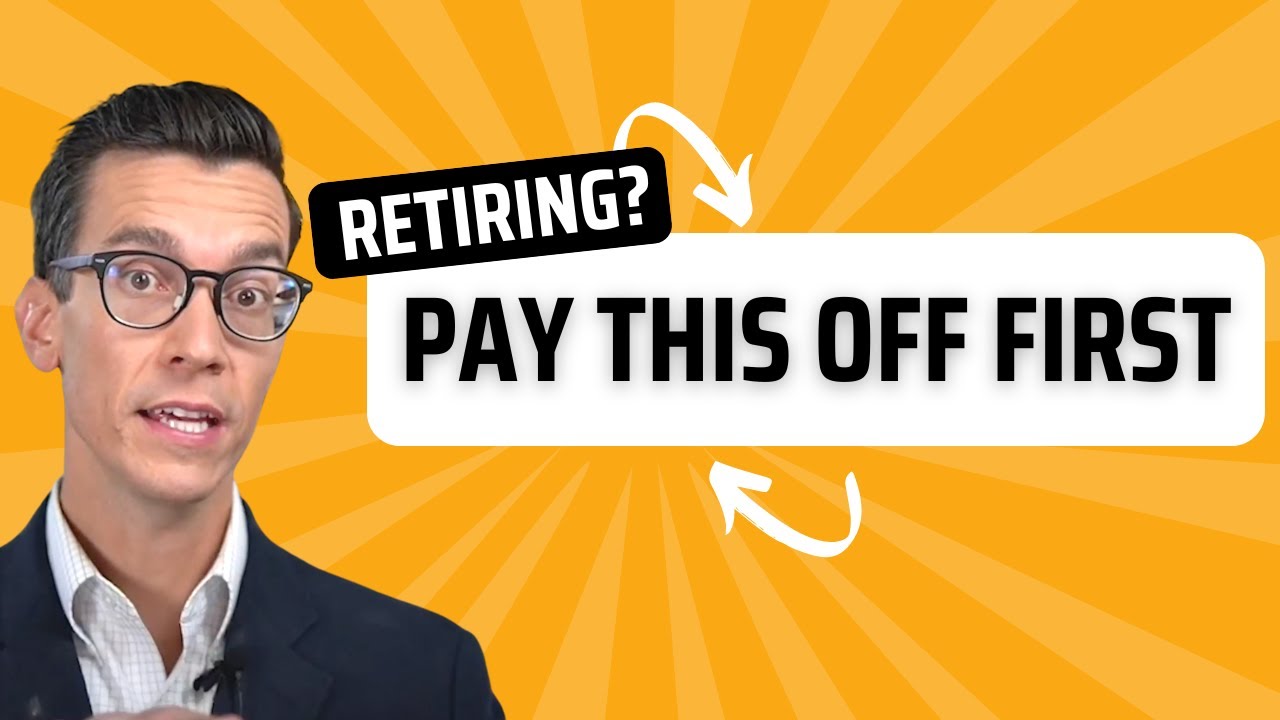
Pay This Off Before You Retire – Retirement Planning Tips
Jason 0 Comments Retire Wealthy Retirement Planning Tips for Retiree's
in this video we'll look at what expenses you should think about getting rid of before retiring and a few mistakes that retirees make when it comes to expenses in retirement there's a few things that you may want to say goodbye to before you say goodbye to that wage or that work income we're going to cover this in three parts it's going to look like this first we'll go over needs and wants and then what i'd call highway robbery and then also what to ear mark in retirement we've seen that the retirees that can get rid of these expenses before retiring have a little bit more breathing room and they feel better about their retirement plan because when you're planning for retirement we usually think about really two types of expenses it's the needs which are the essentials the absolute must-haves to just live you know as you think about my maslow's hierarchy of needs those things at the base layer and then there's the wants which are the the nice to have things but then there are other types of expenses that really don't fit into that category of needs or wants those are the things that we need to be done with before retirement and by the way i'm dave zoller and me and my team we run streamline financial it's a wealth management firm focused on retirement planning and we've been helping people personally for 13 years and streamlines been around for 22 years and we created this channel to share what's working with our clients so that you can benefit too so if you're close to retirement be sure to subscribe because i share one new video each week to make your retirement a little bit better i also put some free resources in the description below like my favorite diy retirement planner if you're more of a do-it-yourselfer so let's get into the list and then as you're watching if i leave something out please share it in the comments below i'd love to hear from you and then also i'll try to reply back to depending on how many comments i get so the first two you will probably agree with but you might not be thinking about the other ones and i want to show you ways to prepare and just make sure that your retirement is a little bit smoother by using our retirement planning software the first one which you already know is to pay off high interest debt which i sometimes think of as highway robbery it's when those interest rates are just so high and they're charging people it just seems unfair right that high interest debt i'm referring to is usually credit card debt and sometimes it's student loan debt and you'd be surprised at the number of people who in their first year of retirement they still have a large monthly payment towards credit card payments or student loan debt and this should be the number one thing that we should focus on to really reduce before we say goodbye to that job income or that wage because if you retire with credit card debt and then you get serious about paying it off in retirement then that means you've got this bigger amount that you got to take from investments which could alter your retirement plans i helped a woman recently who's not a client but she was looking at her plan and she wanted some help and she had about 20k of credit card debt she also had over a million dollars and her regular expenses adding on this 20k of a lump sum expense to her plan it really made quite an impact and once we looked at that together it gave her the motivation to work a little bit extra and extra hard to get this debt payment down to zero or get the credit card debt down to zero before retiring because she'd have a greater peace of mind and it would just increase her confidence as she was going into retirement that peace of mind it's key right i'm sure you're feeling the same way i actually want to share a little bit more about how to achieve this before you retire and during retirement and i share that at the end of this video so stay tuned the next ones are expenses that you can either pay early or at least you want to earmark these in your retirement plan and i'll show you what i mean when i say earmark that just means setting aside funds for specific purposes and either not including those funds in your retirement plan or including them but at least showing the specifics within the plan and i'll show you some images coming up of a retirement plan and how to do this number one thing to earmark is any big travel expenses that you're looking forward to that first year of retirement or really the first few years of retirement a lot of people kick off retirement and they'll really have a big special trip that they've always wanted to take or a place that they've always wanted to go to and lots of times that vacation it's going to cost more than the typical vacation that you might take on a regular year it's really that cap to uh ending work and then really doing a bigger than normal trip some clients choose to take one of those european uh river cruises that are pretty popular and they can cost 10 to 20k or more and knowing that this is a bigger than normal expense or a lump sum expense coming soon into retirement you can either pay that ahead of time like actually many of the cruise places make you do or you can at least earmark it in the plan and make sure that it all works with everything and i'll throw it in there as an example coming up soon here's an example of a retirement plan that's based on annual expenses going up each year three percent regular inflation rate and then over on the left side we can add some expenses that are bigger and irregular you know not the regular every year expenses but things we can earmark so that we can see the impact of on the plan before actually spending the money and doing it this way we can add some peace of mind to your retirement plan and your confidence as you're spending money and so you can just feel that it's a good decision and feel good about that vacation or whatever it might be a few other bigger than normal one-time expenses we've seen are related to your adult kids if you have them whether it's final college expenses or maybe a wedding that you want to help out with or future gifts maybe towards a home purchase or something like that for those you're not really able to pay those before you retire because we don't know when they're going to happen so earmarking them is the next best step and setting funds aside to make sure that these potential expenses that you might have in the future are ready and available ready to deploy when needed one mistake that we've seen some retirees make getting close to retirement is not factoring in these one-time expenses and then getting caught a little off guard when it's time to pay for them especially if we're in a market like we are now now you might be thinking one big expense that i did not mention and before i share that one if you enjoyed watching this video so far and you found it helpful please click the like button so this can hopefully spread to other people who are like you and might find it helpful as well so that one big expense that you might be thinking of that i didn't mention yet is paying off your whole mortgage before you retire and this is a big one for many people as you've heard before behind every financial decision there's also an emotional one as well and many people they feel very strongly or maybe adamant on on being debt-free in retirement and that's a really good feeling for for many people for others depending on their financial decision it actually a mortgage could actually make sense in retirement some people see it as a fixed expense which doesn't go up with inflation it actually gets cheaper as everything else increases with inflation and as one dollar can buy less and less over time which is basically what what inflation is it may be at really attractive interest rates as well and some people want to have a little bit more flexibility in their retirement accounts by keeping some funds available in their non-retirement accounts versus using that money to pay off the mortgage the more important thing to to think about when deciding whether this makes sense whether to pay it off or not is try to measure first just the emotional feeling or comfort with debt you know yourself and then also your spouse if you're married and then step two is map out both scenarios what does it look like that plan that we're just looking at over here what does it look like if you pay off debt early or don't pay off the mortgage at all look at the difference see which one's okay lots of times it comes down to the strength of the emotional feeling around debt for one person in the relationship or if it's just you then it's just whatever you prefer when we're thinking about paying off expenses or earmarking things in retirement get help from a financial professional a cfp could be a great place to start but i'd like to hear from you what did i not mention as we're thinking about these different expenses in retirement i'd love to hear your thoughts about these expenses and especially the thoughts on mortgage having a mortgage in retirement and i want to share another video about how increasing peace of mind and making sure that you get both parts needed for a successful retirement the sad thing is that in this industry the financial industry most of the time they focus on one thing but here's a video to watch that'll help you think about and prepare for both sides of retirement so hopefully i'll see you there and if you haven't already subscribe and then i'll see you in future videos take care you

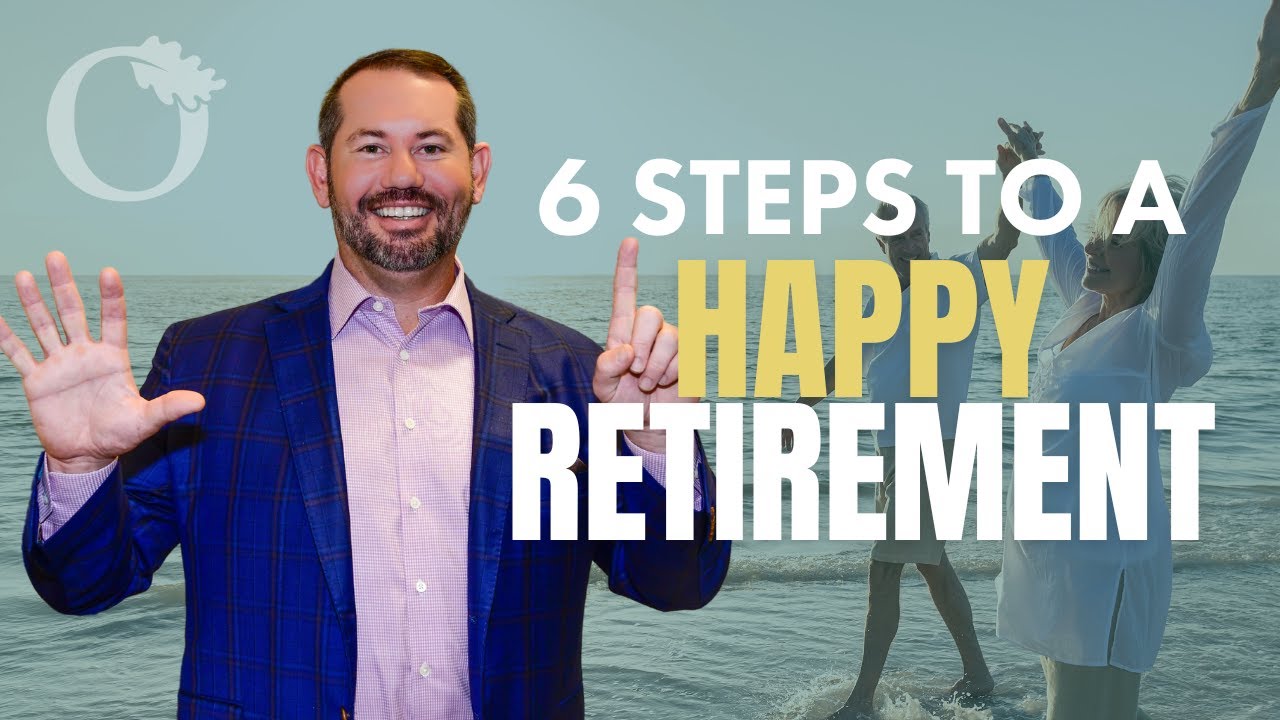
Retirement Planning From a CFP® Professional: 6 Keys to a Happy and Successful Retirement
Jason 0 Comments Retire Wealthy Retirement Planning Tips for Retiree's
sometimes I feel like I've lived through my 60s and 70s thousands of times sitting with people in retirement or those that are entering retirement we come across a lot of the same fears negative thoughts and feelings that really hold people back from having a happier retirement now we try to address those through retirement strategy and implementing plans but in today's video instead of talking about strategy I want to talk to you about how we look at retirement so you can hopefully look at retirement through a different lens and I believe this will help you have a happier retirement foreign [Music] Happy Gilmore recently and there's this place that he goes to and he calls it his happy place and if you remember the movie the lead actress she's sitting there by like a fountain of beer with pictures and Happy's grandmothers there and it's just his happy place and this helps Happy Gilmore putt a little bit better to find your happy place in retirement I want you to shift your focus away from simply trying to maximize return in retirement it's not about growing Your Nest Egg anymore what we want to do is have an acceptable level of risk something that when the market goes down we can still stay invested we can stay committed to that plan but at the same time for that level of risk we have an expected return that can help make sure that you don't run out of money and generate enough growth to provide the income that you need to maintain your standard of living so here is one of the tools that we use to help understand your willingness to take risk so risk tolerance really has two components it has a capacity component meaning given a certain level of income that you desire from your portfolio can your portfolio withstand a certain level of risk and still provide that income so that's what we call risk capacity but then you have your willingness to stay invested in a down market so when we look here this is a standard 60 40 portfolio 600 000 stocks 400 000 in bonds has a risk number on a scale of 1 to 99 of 54.

now in isolation that means absolutely nothing to you but when we start to break it down into percentages and also or I should say more importantly dollars over a six month period your standard 60 40 portfolio has the potential to lose a hundred thousand dollars with a million invested this is a statistical quantitative analysis of volatility of this portfolio going back many years now over a 12-month period that means you could lose two hundred and twelve thousand dollars mathematically speaking is that a comfortable level of risk for you if you have a million dollars it's not for me to answer that's for you to answer that's your willingness to take risk so over a 12-month period mathematically you should expect to lose at some point in time up to twenty percent you could lose more of course this is a 95 probability or what we call two standard deviations but we have what we want to achieve here is a more optimal level of risk for an expected return so we have asymmetry here where the possible upside mathematically speaking is 15.92 percent over a six month period so we do have some asymmetry here but when we look a little bit deeper the annual range midpoint is 5.27 so this would be the expected return kind of moving forward with a two percent dividend this GPA this is a pretty cool feature of this software it's designed to help you understand what we call risk adjusted returns and this is this concept is kind of what I'm talking about here they've developed this GPA and a 4.3 would be most Optimum now not every portfolio that fits your particular needs is going to be a 4.3 we're not necessarily trying to achieve that but the higher we can get to that it means we have more expected return for the For Less risk so the question really becomes are you comfortable with this range of expected outcome if not this is too aggressive of a portfolio for you but instead of just focusing on like most people do the upside we need to focus more on this downside in having a plan that is optimized or having an investment strategy that's optimized for your happy place number two I want you to start to look at all of your investment choices in retirement for what they actually are now this is much different than in the accumulation phase in the retirement phase your financial investments all the various choices out there they're really nothing more than tools tools that are used to accomplish a certain objective similar to ingredients in a recipe if you have too much sugar or too much salt or not enough herbs or spices is it may not come out the way you want it to taste we want to use the appropriate tools to accomplish the objectives that you have in retirement stocks for example they aren't used to accumulate anymore stocks are designed to help keep you ahead of inflation so you can generate income that lasts as long as you do now in the accumulation phase that's exactly what stocks are designed to do they're designed to give you the best opportunity historically speaking to accumulate a larger and larger Nest Egg of course that assumes that you save enough money but in retirement you are no longer accumulating you are Distributing so stocks are used to help keep you ahead of inflation now the downside to stocks you could lose a lot of money especially if you get too aggressive or if you invest in things that don't perform well now does that make stocks bad because you could lose a whole bunch of money no they're just a tool and once you understand how to use that tool in conjunction with other tools now you can actually construct whatever project that you're building or have a retirement plan that provides you the income you need to maintain your standard of living the number three key for a happier retirement I want you to accept that you're in the distribution phase don't expect your accounts to continue to grow each and every single year this may seem like common sense but in reality and in practice it's much harder for many people to do now you've seen your accounts hopefully grow grow grow you've been putting money in the market has performed well over most years in the past even when the market performed poorly you are still putting money into your 401k getting that match hopefully saving money elsewhere now that you're in the retirement phase you're putting a lot of stress on your portfolio through distributions now I'm not saying your accounts can't still continue to accumulate especially if we have consecutive years in the market that that does really really well but what I'm saying is don't expect it you are in the distribution phase that means you're probably taking three percent four percent five percent out when we have years where the market is also down your portfolio is down you're digging a bigger hole than you were in the accumulation phase that means that hole is harder and harder to climb out of this is why the allocation of your Investments is so important and not taking too much risk you don't want to dig such a big hole that you can never get out but at the same time you need a certain level of risk to achieve a return that can give you a Secure Retirement so mentally let's not look at our accounts every single year and say oh man they're not going up they're not increasing in value I'm going to run out I need to stop spending my money now actually if you look at it appropriately you should not expect your accounts to continue to appreciate every single year in retirement that very May well happen but if it doesn't if you're just staying level or even going down a little bit it's okay you just need to have a plan monitor your progress with respect to your goals and stay on top of it number four I want you to understand the value of secure income in retirement the more secure income you have the less you have to withdraw from your portfolio and the less emotionally you're impacted by the stock market ups and downs by political goings on by economic slow Downs if you don't have to withdraw large percentages from your Investments because you're living on passive income from Real Estate from Social Security from annuities from a pension but the point is the more income you have coming in from multiple different places that is independent of the stock market going up typically the happier you'll be in retirement also I don't want you to underestimate the power of Social Security as part of your overall retirement income plan now I hear a lot of people making comments on some of the Social Security videos that we do and also just day to day having conversations with clients that Social Security seems to be an extremely underestimated part of retirement many people want to take it early and that may be the case maybe it makes sense for you to take it early but if a husband and wife have combined Social Security of 60 000 a year and you live let's say 25 years that's 600 000 1.2 1.5 million dollars of retirement income and for many of you watch watching this your Social Security is going to be a lot more than sixty thousand dollars per year so we're talking anywhere from one million to possibly over three million dollars of retirement income for a married couple for someone who's single Social Security you can just basically cut that in half so it's a significant part don't underestimate the power of secure sources of income in retirement and also don't underestimate how valuable deferring Social Security could potentially be if you're going to live past age 80 81 or so number five I would like you to stop looking at short-term outcomes whether your portfolio is up or down whether you pull too much out whether you had an unforeseen expense and you had to spend x amount of dollars I'd like you to start looking at these short-term outcomes of things that happen to you or decisions that you've made as nothing more than bumps in the road don't get too high don't get too low retirement is a very long and windy and arduous Journey this is why it's so important to have a plan and stay connected to that because when you have visibility into the future and you're looking at things not in the short term lens but over a 20 25 30 year time frame you can see a lot of times how actually unimportant these short-term events are so don't get too high don't get too low understand that these are bumps in the road in the short term but if you have a plan these bumps in the road have been accounted for next time the Market's down and your portfolio is down 10 or 12 or 15 or more say you know what I have a plan I expected this to happen this is not a surprise and retirement is a very long journey this is nothing more than a bump in the road the number six key to a happier retirement and I know this is going to be virtually impossible for many of you watching but the number six key probably the number one is to not look at your accounts more than once a month I would prefer it once a quarter so I know some of you right now are saying Troy that's impossible I look at it every single day I need to know what my stocks are doing what my accounts are doing how am I ever going to know if I'm going to be okay well there are numerous studies on this I encourage you to look some of them up the more frequently you look at your accounts typically the worst performance you'll have over long periods of time but the person who looks at it every single day over a long period of time I think it's 25 or 30 years averages somewhere around two to three percent per year the person who looks at it once a month averages somewhere around four to five the person who looks at it once a year averages somewhere around six to seven and the person who never looks at it has averaged around 10 or 11 percent and it makes sense because we are emotional beings when we see that something isn't going right we want to Tinker we want to make adjustments this typically leads to holding on to bad Investments maybe a little bit too long or getting rid of good Investments that just haven't really had the Catalyst that maybe you were expecting and selling them too soon or we're selling our winners and cutting our losers without giving them a chance to really perform well whatever the situation may be Studies have proven this over and over again the more frequently you look at your portfolio the worse you should expect to do so instead of discussing strategy and execution in today's video hopefully today's content helps shift your perspective just a little bit with the goal of helping you to have a happier retirement [Music] foreign [Music]
Read More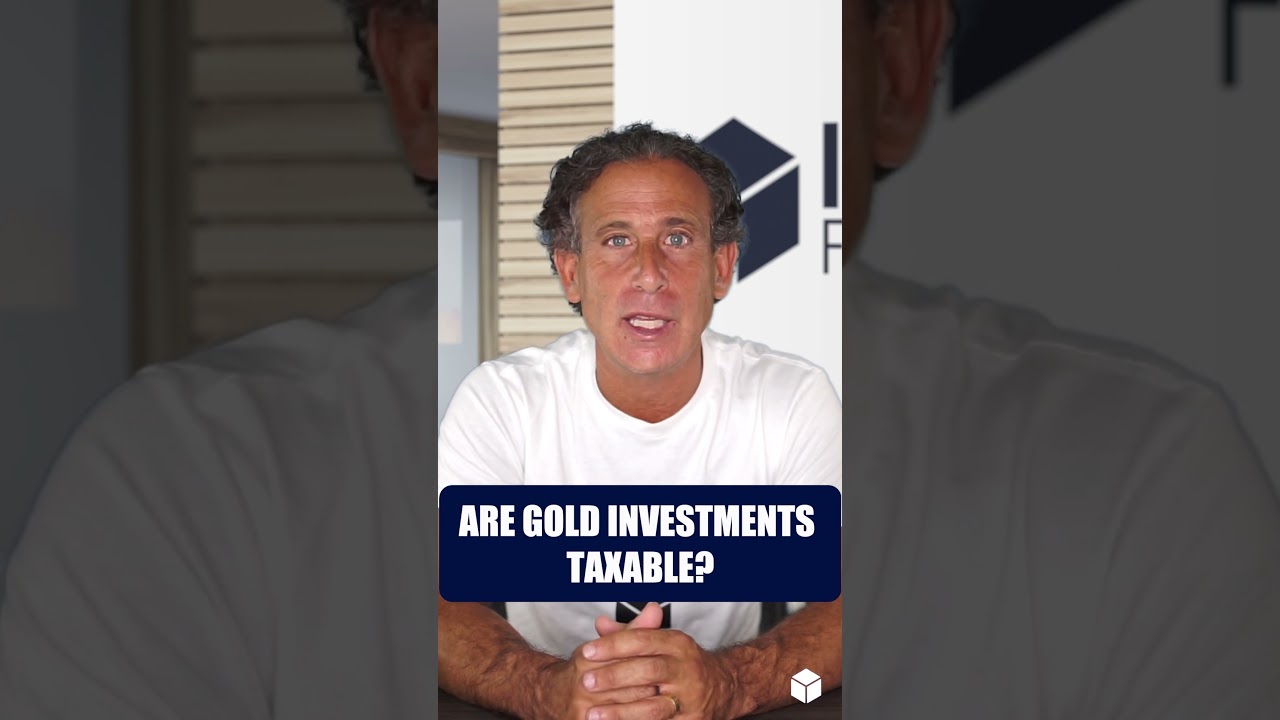
Are Gold IRA Investments Taxable?
Jason 0 Comments Retire Wealthy Retirement Planning
Are gold IRA investments taxable?
No! Thankfully, when you use a self-directed IRA to buy gold, so long as you're holding
it at a US depository, when you sell the gold, all gains will
flow back to your IRA with no tax. In addition to diversification,
the advantage of generating tax-free returns from your gold IRA investment
is what makes it so popular..

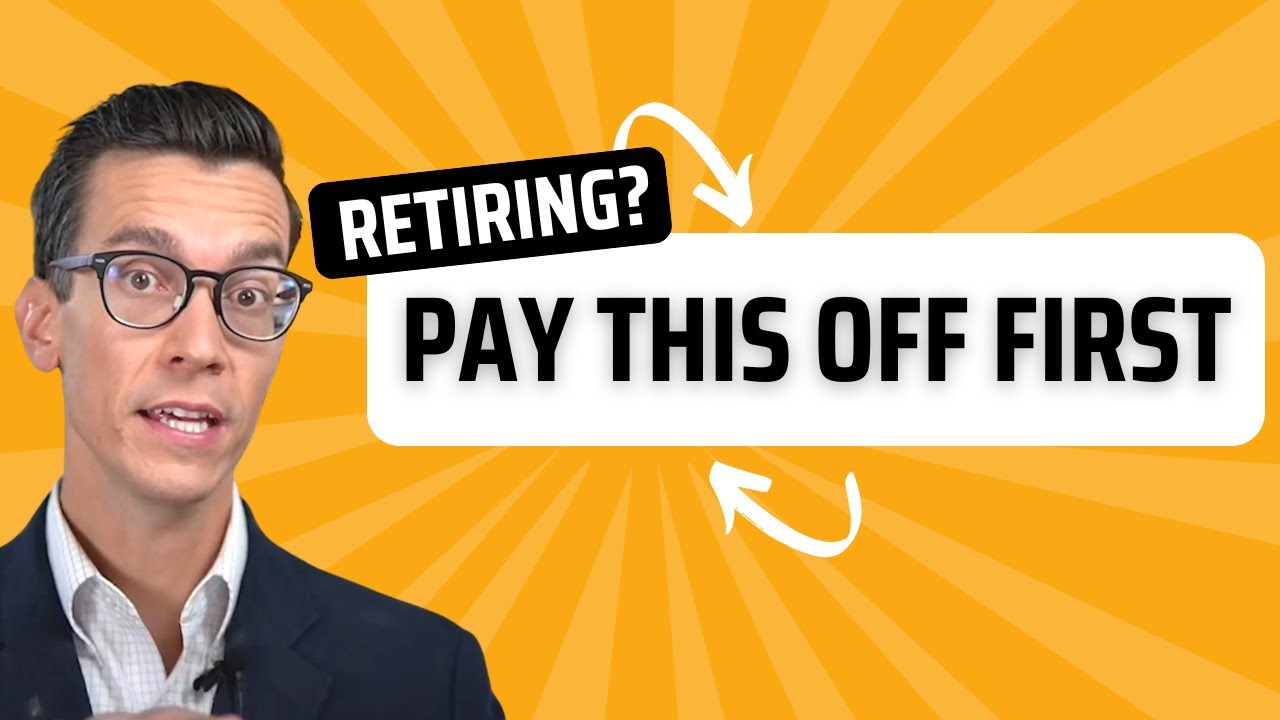
Pay This Off Before You Retire – Retirement Planning Tips
Jason 0 Comments Retire Wealthy Retirement Planning Tips for Retiree's
in this video we'll look at what expenses you should think about getting rid of before retiring and a few mistakes that retirees make when it comes to expenses in retirement there's a few things that you may want to say goodbye to before you say goodbye to that wage or that work income we're going to cover this in three parts it's going to look like this first we'll go over needs and wants and then what i'd call highway robbery and then also what to ear mark in retirement we've seen that the retirees that can get rid of these expenses before retiring have a little bit more breathing room and they feel better about their retirement plan because when you're planning for retirement we usually think about really two types of expenses it's the needs which are the essentials the absolute must-haves to just live you know as you think about my maslow's hierarchy of needs those things at the base layer and then there's the wants which are the the nice to have things but then there are other types of expenses that really don't fit into that category of needs or wants those are the things that we need to be done with before retirement and by the way i'm dave zoller and me and my team we run streamline financial it's a wealth management firm focused on retirement planning and we've been helping people personally for 13 years and streamlines been around for 22 years and we created this channel to share what's working with our clients so that you can benefit too so if you're close to retirement be sure to subscribe because i share one new video each week to make your retirement a little bit better i also put some free resources in the description below like my favorite diy retirement planner if you're more of a do-it-yourselfer so let's get into the list and then as you're watching if i leave something out please share it in the comments below i'd love to hear from you and then also i'll try to reply back to depending on how many comments i get so the first two you will probably agree with but you might not be thinking about the other ones and i want to show you ways to prepare and just make sure that your retirement is a little bit smoother by using our retirement planning software the first one which you already know is to pay off high interest debt which i sometimes think of as highway robbery it's when those interest rates are just so high and they're charging people it just seems unfair right that high interest debt i'm referring to is usually credit card debt and sometimes it's student loan debt and you'd be surprised at the number of people who in their first year of retirement they still have a large monthly payment towards credit card payments or student loan debt and this should be the number one thing that we should focus on to really reduce before we say goodbye to that job income or that wage because if you retire with credit card debt and then you get serious about paying it off in retirement then that means you've got this bigger amount that you got to take from investments which could alter your retirement plans i helped a woman recently who's not a client but she was looking at her plan and she wanted some help and she had about 20k of credit card debt she also had over a million dollars and her regular expenses adding on this 20k of a lump sum expense to her plan it really made quite an impact and once we looked at that together it gave her the motivation to work a little bit extra and extra hard to get this debt payment down to zero or get the credit card debt down to zero before retiring because she'd have a greater peace of mind and it would just increase her confidence as she was going into retirement that peace of mind it's key right i'm sure you're feeling the same way i actually want to share a little bit more about how to achieve this before you retire and during retirement and i share that at the end of this video so stay tuned the next ones are expenses that you can either pay early or at least you want to earmark these in your retirement plan and i'll show you what i mean when i say earmark that just means setting aside funds for specific purposes and either not including those funds in your retirement plan or including them but at least showing the specifics within the plan and i'll show you some images coming up of a retirement plan and how to do this number one thing to earmark is any big travel expenses that you're looking forward to that first year of retirement or really the first few years of retirement a lot of people kick off retirement and they'll really have a big special trip that they've always wanted to take or a place that they've always wanted to go to and lots of times that vacation it's going to cost more than the typical vacation that you might take on a regular year it's really that cap to uh ending work and then really doing a bigger than normal trip some clients choose to take one of those european uh river cruises that are pretty popular and they can cost 10 to 20k or more and knowing that this is a bigger than normal expense or a lump sum expense coming soon into retirement you can either pay that ahead of time like actually many of the cruise places make you do or you can at least earmark it in the plan and make sure that it all works with everything and i'll throw it in there as an example coming up soon here's an example of a retirement plan that's based on annual expenses going up each year three percent regular inflation rate and then over on the left side we can add some expenses that are bigger and irregular you know not the regular every year expenses but things we can earmark so that we can see the impact of on the plan before actually spending the money and doing it this way we can add some peace of mind to your retirement plan and your confidence as you're spending money and so you can just feel that it's a good decision and feel good about that vacation or whatever it might be a few other bigger than normal one-time expenses we've seen are related to your adult kids if you have them whether it's final college expenses or maybe a wedding that you want to help out with or future gifts maybe towards a home purchase or something like that for those you're not really able to pay those before you retire because we don't know when they're going to happen so earmarking them is the next best step and setting funds aside to make sure that these potential expenses that you might have in the future are ready and available ready to deploy when needed one mistake that we've seen some retirees make getting close to retirement is not factoring in these one-time expenses and then getting caught a little off guard when it's time to pay for them especially if we're in a market like we are now now you might be thinking one big expense that i did not mention and before i share that one if you enjoyed watching this video so far and you found it helpful please click the like button so this can hopefully spread to other people who are like you and might find it helpful as well so that one big expense that you might be thinking of that i didn't mention yet is paying off your whole mortgage before you retire and this is a big one for many people as you've heard before behind every financial decision there's also an emotional one as well and many people they feel very strongly or maybe adamant on on being debt-free in retirement and that's a really good feeling for for many people for others depending on their financial decision it actually a mortgage could actually make sense in retirement some people see it as a fixed expense which doesn't go up with inflation it actually gets cheaper as everything else increases with inflation and as one dollar can buy less and less over time which is basically what what inflation is it may be at really attractive interest rates as well and some people want to have a little bit more flexibility in their retirement accounts by keeping some funds available in their non-retirement accounts versus using that money to pay off the mortgage the more important thing to to think about when deciding whether this makes sense whether to pay it off or not is try to measure first just the emotional feeling or comfort with debt you know yourself and then also your spouse if you're married and then step two is map out both scenarios what does it look like that plan that we're just looking at over here what does it look like if you pay off debt early or don't pay off the mortgage at all look at the difference see which one's okay lots of times it comes down to the strength of the emotional feeling around debt for one person in the relationship or if it's just you then it's just whatever you prefer when we're thinking about paying off expenses or earmarking things in retirement get help from a financial professional a cfp could be a great place to start but i'd like to hear from you what did i not mention as we're thinking about these different expenses in retirement i'd love to hear your thoughts about these expenses and especially the thoughts on mortgage having a mortgage in retirement and i want to share another video about how increasing peace of mind and making sure that you get both parts needed for a successful retirement the sad thing is that in this industry the financial industry most of the time they focus on one thing but here's a video to watch that'll help you think about and prepare for both sides of retirement so hopefully i'll see you there and if you haven't already subscribe and then i'll see you in future videos take care you

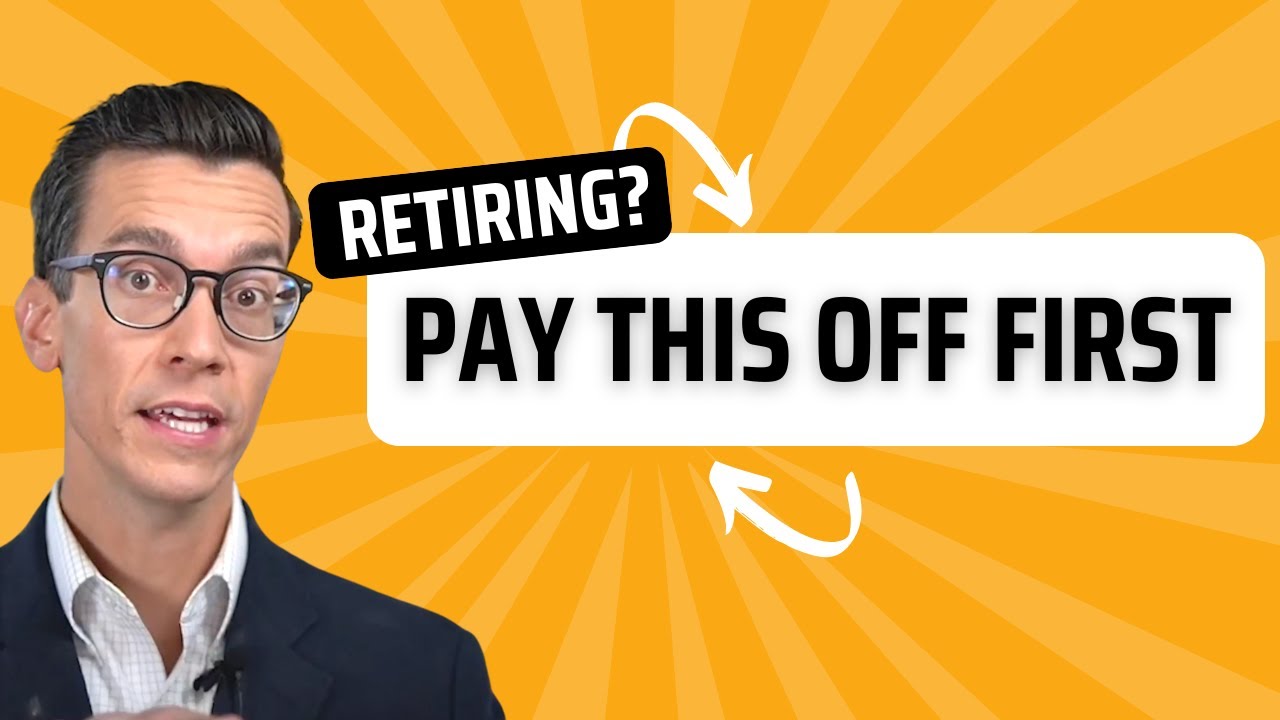
Pay This Off Before You Retire – Retirement Planning Tips
Jason 0 Comments Retire Wealthy Retirement Planning Tips for Retiree's
in this video we'll look at what expenses you should think about getting rid of before retiring and a few mistakes that retirees make when it comes to expenses in retirement there's a few things that you may want to say goodbye to before you say goodbye to that wage or that work income we're going to cover this in three parts it's going to look like this first we'll go over needs and wants and then what i'd call highway robbery and then also what to ear mark in retirement we've seen that the retirees that can get rid of these expenses before retiring have a little bit more breathing room and they feel better about their retirement plan because when you're planning for retirement we usually think about really two types of expenses it's the needs which are the essentials the absolute must-haves to just live you know as you think about my maslow's hierarchy of needs those things at the base layer and then there's the wants which are the the nice to have things but then there are other types of expenses that really don't fit into that category of needs or wants those are the things that we need to be done with before retirement and by the way i'm dave zoller and me and my team we run streamline financial it's a wealth management firm focused on retirement planning and we've been helping people personally for 13 years and streamlines been around for 22 years and we created this channel to share what's working with our clients so that you can benefit too so if you're close to retirement be sure to subscribe because i share one new video each week to make your retirement a little bit better i also put some free resources in the description below like my favorite diy retirement planner if you're more of a do-it-yourselfer so let's get into the list and then as you're watching if i leave something out please share it in the comments below i'd love to hear from you and then also i'll try to reply back to depending on how many comments i get so the first two you will probably agree with but you might not be thinking about the other ones and i want to show you ways to prepare and just make sure that your retirement is a little bit smoother by using our retirement planning software the first one which you already know is to pay off high interest debt which i sometimes think of as highway robbery it's when those interest rates are just so high and they're charging people it just seems unfair right that high interest debt i'm referring to is usually credit card debt and sometimes it's student loan debt and you'd be surprised at the number of people who in their first year of retirement they still have a large monthly payment towards credit card payments or student loan debt and this should be the number one thing that we should focus on to really reduce before we say goodbye to that job income or that wage because if you retire with credit card debt and then you get serious about paying it off in retirement then that means you've got this bigger amount that you got to take from investments which could alter your retirement plans i helped a woman recently who's not a client but she was looking at her plan and she wanted some help and she had about 20k of credit card debt she also had over a million dollars and her regular expenses adding on this 20k of a lump sum expense to her plan it really made quite an impact and once we looked at that together it gave her the motivation to work a little bit extra and extra hard to get this debt payment down to zero or get the credit card debt down to zero before retiring because she'd have a greater peace of mind and it would just increase her confidence as she was going into retirement that peace of mind it's key right i'm sure you're feeling the same way i actually want to share a little bit more about how to achieve this before you retire and during retirement and i share that at the end of this video so stay tuned the next ones are expenses that you can either pay early or at least you want to earmark these in your retirement plan and i'll show you what i mean when i say earmark that just means setting aside funds for specific purposes and either not including those funds in your retirement plan or including them but at least showing the specifics within the plan and i'll show you some images coming up of a retirement plan and how to do this number one thing to earmark is any big travel expenses that you're looking forward to that first year of retirement or really the first few years of retirement a lot of people kick off retirement and they'll really have a big special trip that they've always wanted to take or a place that they've always wanted to go to and lots of times that vacation it's going to cost more than the typical vacation that you might take on a regular year it's really that cap to uh ending work and then really doing a bigger than normal trip some clients choose to take one of those european uh river cruises that are pretty popular and they can cost 10 to 20k or more and knowing that this is a bigger than normal expense or a lump sum expense coming soon into retirement you can either pay that ahead of time like actually many of the cruise places make you do or you can at least earmark it in the plan and make sure that it all works with everything and i'll throw it in there as an example coming up soon here's an example of a retirement plan that's based on annual expenses going up each year three percent regular inflation rate and then over on the left side we can add some expenses that are bigger and irregular you know not the regular every year expenses but things we can earmark so that we can see the impact of on the plan before actually spending the money and doing it this way we can add some peace of mind to your retirement plan and your confidence as you're spending money and so you can just feel that it's a good decision and feel good about that vacation or whatever it might be a few other bigger than normal one-time expenses we've seen are related to your adult kids if you have them whether it's final college expenses or maybe a wedding that you want to help out with or future gifts maybe towards a home purchase or something like that for those you're not really able to pay those before you retire because we don't know when they're going to happen so earmarking them is the next best step and setting funds aside to make sure that these potential expenses that you might have in the future are ready and available ready to deploy when needed one mistake that we've seen some retirees make getting close to retirement is not factoring in these one-time expenses and then getting caught a little off guard when it's time to pay for them especially if we're in a market like we are now now you might be thinking one big expense that i did not mention and before i share that one if you enjoyed watching this video so far and you found it helpful please click the like button so this can hopefully spread to other people who are like you and might find it helpful as well so that one big expense that you might be thinking of that i didn't mention yet is paying off your whole mortgage before you retire and this is a big one for many people as you've heard before behind every financial decision there's also an emotional one as well and many people they feel very strongly or maybe adamant on on being debt-free in retirement and that's a really good feeling for for many people for others depending on their financial decision it actually a mortgage could actually make sense in retirement some people see it as a fixed expense which doesn't go up with inflation it actually gets cheaper as everything else increases with inflation and as one dollar can buy less and less over time which is basically what what inflation is it may be at really attractive interest rates as well and some people want to have a little bit more flexibility in their retirement accounts by keeping some funds available in their non-retirement accounts versus using that money to pay off the mortgage the more important thing to to think about when deciding whether this makes sense whether to pay it off or not is try to measure first just the emotional feeling or comfort with debt you know yourself and then also your spouse if you're married and then step two is map out both scenarios what does it look like that plan that we're just looking at over here what does it look like if you pay off debt early or don't pay off the mortgage at all look at the difference see which one's okay lots of times it comes down to the strength of the emotional feeling around debt for one person in the relationship or if it's just you then it's just whatever you prefer when we're thinking about paying off expenses or earmarking things in retirement get help from a financial professional a cfp could be a great place to start but i'd like to hear from you what did i not mention as we're thinking about these different expenses in retirement i'd love to hear your thoughts about these expenses and especially the thoughts on mortgage having a mortgage in retirement and i want to share another video about how increasing peace of mind and making sure that you get both parts needed for a successful retirement the sad thing is that in this industry the financial industry most of the time they focus on one thing but here's a video to watch that'll help you think about and prepare for both sides of retirement so hopefully i'll see you there and if you haven't already subscribe and then i'll see you in future videos take care you


Recent Comments